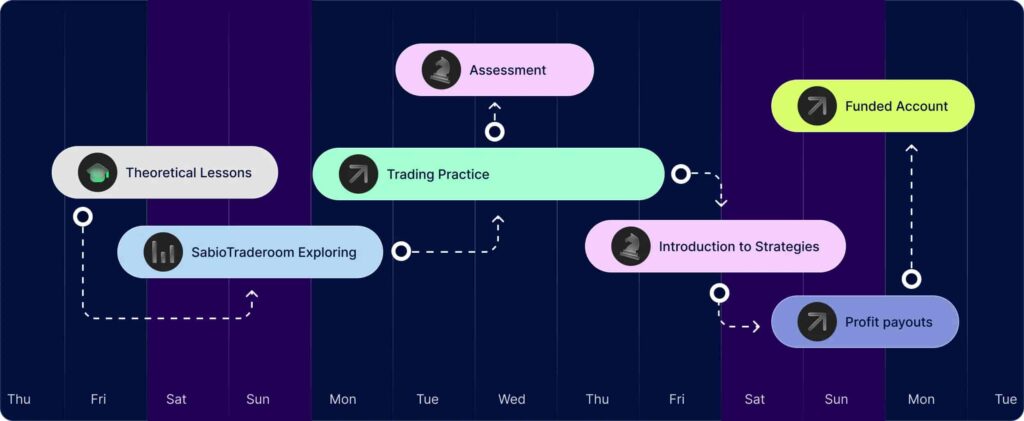Your unique opportunity to trade with large capital and profit from the market
In recent years, Prop Trading – or Proprietary Trading – has gained increasing attention within the trading community. While many traders trade with their own capital in the markets, Prop Trading offers a completely different opportunity: trading with a company’s capital, or in other words, trading with borrowed funds.
For ambitious traders who want to prove their skills and gain access to larger trading opportunities, Prop Trading is an attractive option. But what exactly is Prop Trading, and why is it becoming more popular?
The reasons for the growing interest in Prop Trading are varied. Firstly, Prop Trading offers traders the opportunity to trade large positions without having to risk their own capital. This is especially appealing when it comes to trading futures without limitations.
For many, Prop Trading is not just a career option, but a way to break into professional trading more quickly. Before we dive deeper into the advantages and challenges, let’s have a closer look at what Prop Trading really means.

What is Prop Trading?
Prop Trading, short for “Proprietary Trading,” means that a trader uses a company’s capital to generate profits. Unlike an ordinary trader who risks their own money in the market, a Prop Trader uses the financial resources of a company.
The main difference from classic retail trading, where traders use only their own money, is that Prop Traders share both the risk and the reward with the firm. The Prop Trading firm provides the capital, and in return, the trader receives a share of the profits. Typically, this profit-sharing occurs on a percentage basis.
Another crucial aspect is that Prop Traders have access to significantly more capital than retail traders. While an individual trader is often limited by their own funds or leverage, a Prop Trader can take larger positions thanks to the firm’s capital and benefit from even small market movements. Additionally, Prop Traders often have access to advanced tools, data, and technologies that help them make precise and efficient trading decisions – tools that are usually unavailable to the average retail trader.
In short: Prop Trading is a way for talented traders to leverage institutional capital to trade while sharing both the risks and rewards with the Prop Trading firm. The growing interest in this form of trading is due to several factors. For one, Prop Trading offers traders the chance to trade large positions without risking their own capital. This is particularly appealing for those looking to trade futures without limitations.
Only a few companies offer real money trading
Another important distinction in Prop Trading concerns the use of capital. Fundamentally, Prop Trading means trading with borrowed funds, but trading with real capital is now rather the exception.
Many Prop Trading firms protect themselves from potential losses by initially allowing their traders to trade only on demo accounts. On these accounts, traders can prove their abilities without risking the company’s own capital.
However, there are a few companies that offer traders the opportunity to trade with real capital after successfully passing several performance levels. These firms require traders to demonstrate exceptional skills and specialized expertise before they are allowed to take responsibility for a real trading account.
Only those who consistently prove themselves through successful, disciplined trading receive the opportunity to trade the firm’s capital in real markets and share in the profits. At this point, the realm of asset management is already being touched upon.
Advantages of Prop Trading
Prop Trading offers a number of advantages that make it an attractive option for ambitious traders. One of the biggest benefits is that Prop Traders do not have to risk their own capital.
This is particularly appealing to traders who have the skills to trade successfully but do not possess the capital needed to trade on a large scale.
Another major advantage is access to large amounts of capital. Prop Trading firms provide their traders with significantly more capital than a single retail trader could typically access. This means that Prop Traders can take much larger positions, especially in futures trading.
Lastly, Prop Trading also offers a form of risk mitigation. Since traders do not use their own capital, they don’t have to worry about personal losses as much.
This allows them to focus fully on trading and worry less about fear of losses. At the same time, most Prop firms have strict risk management rules in place to ensure traders do not overly risk the firm’s capital.
Challenges and risks in prop trading
While Prop Trading offers numerous advantages, there are also some challenges and risks that traders should be aware of. One of the biggest hurdles is the strict risk limits. Prop Trading challenges often come with strict performance requirements, meaning that several loss trades can quickly lead to elimination from the challenge.
These performance requirements vary from firm to firm, but most are highly restrictive. Traders who struggle to follow rules and strategies or make emotional decisions in trading risk being quickly removed from the program.
Prop Trading firms typically enforce a very disciplined risk management system, with clear rules on how much risk a trader is allowed to take. Traders who don’t adhere to these rules can quickly lose their trading rights. In popular trading groups, you can often read about traders being excluded from challenges due to violations of a firm’s rules or terms of service.
Many of these firms have now implemented very strict risk limits. This is because there are talented traders who attempt to exploit the system. These traders often go “all-in,” taking excessive risks to complete the challenges as quickly as possible and secure their payouts.
They aim for high gains in a short period, but in doing so, they are only risking the initial fee or the costs for the challenge itself. To protect themselves from such behaviour, many Prop Trading firms have implemented strict risk management rules.
These guidelines limit the maximum losses a trader can incur per day or over a set period. Traders who exceed these limits often lose access to the Prop account and are removed from the program.
Lastly, Prop Trading is not for everyone. Traders must be willing to follow rules and trade with discipline. Without these qualities, long-term success in Prop Trading is difficult.
Those who believe they can make quick profits without structured risk and time management may find themselves disappointed in this professional environment.
Who should consider prop trading?
Prop Trading is a promising way to trade with large capital and simultaneously work on growing your own capital through profit sharing. However, this type of trading is not suitable for every trader.
Experienced traders in particular, who can already demonstrate a track record of success and are looking for an opportunity to maximize their profits through access to more capital, can benefit from Prop Trading. For them, it’s a way to elevate their trading to a more professional level without risking their own capital.
But it’s not just about experience. Prop Trading requires a particular mindset and discipline. Traders who can remain calm and analytical under pressure will have clear advantages here. Trading with a firm’s capital requires a deep understanding of risk management and the ability to strictly adhere to guidelines. Prop Trading firms place great value on consistent behaviour, not spontaneous or emotionally driven decisions.
Patience is another critical trait. Many Prop Trading programs are designed to test traders step by step and guide them through various performance levels before they are allowed to trade real capital. Traders who hope for immediate results or believe they can circumvent the rules will quickly be disappointed.
The path to a real money account can take months, and those who want long-term success must be willing to face this challenge.
Analytical thinking and the ability to continuously improve are also important. Prop Trading offers the opportunity to not only trade larger amounts, but also to question your performance and constantly refine your approach.
Those who adopt a systematic, disciplined approach to trading and are willing to invest the patience and time needed to achieve long-term success will find Prop Trading an exciting and rewarding opportunity.
For traders who already trade independently, this could be the next step to taking their career to a professional level.
Prop Trading vs. Retail Trading
Prop Trading and retail trading differ in several key areas. The biggest difference lies in the capital used. In Prop Trading, traders typically start with demo accounts, while in retail trading, they exclusively risk their own money.
This distinction has far-reaching consequences. Prop Traders have access to significantly larger amounts of capital, enabling them to take larger positions and benefit from smaller market movements. A retail trader is often limited by their own funds or broker leverage, which can restrict their opportunities.
Conversely, retail traders usually have more freedom and flexibility. They are the sole decision-makers and can trade without the strict guidelines or risk limits of a Prop Trading firm. This means that retail traders can structure their trading strategy and schedule however they like, offering more independence.
However, this freedom also comes with higher risk, as retail traders bear their own losses. A market mistake can hurt much more here since it involves only their own capital.
The profit-sharing structure is another significant difference. While retail traders keep 100% of their profits, Prop Trading profits are split between the trader and the firm. In most cases, however, Prop Traders receive a generous share of the profits, often 50% or more. Despite this sharing, a Prop Trader can potentially earn more than a retail trader with their own capital, thanks to the higher capital available.
The risk factor is also significantly different. Prop Traders benefit from not risking their own capital, protecting them from large personal losses. Retail traders, on the other hand, bear the full risk, which can be emotionally taxing. In volatile markets, this can lead to nervous, emotional decisions that impact success.
In summary, Prop Trading offers access to more capital, structured support, and less personal risk, while retail trading provides more freedom and independence.
The choice depends on your individual goals and trading mentality: if you’re willing to follow clear rules, maintain discipline, and capitalize on big opportunities with lower risk, Prop Trading could be the perfect path for you. However, if you prefer maximum flexibility and full control over your trading decisions, retail trading may be a better fit.
Hoe to choose a Prop Trading firm
Choosing the right Prop Trading firm is crucial to your success. With a wide range of providers available, not all are created equal. Therefore, it’s important to consider some key factors before making your decision.
One critical factor is the reputation of the firm. Reputable Prop Trading firms have a clear track record of success, offer transparent conditions, and are well-regarded in the industry. It’s advisable to read reviews and testimonials from other traders and assess how the firm is perceived. Some firms are known for being trustworthy and offering excellent programs, while others may have a poor reputation for closing accounts frequently.
Another factor to consider is the fee structure. Most Prop Trading firms charge fees for access to platforms or challenge programs. Make sure to check for any hidden costs that might reduce your profits. A transparent and fair fee model is a sign of a reputable firm.
The profit-sharing model is also a crucial aspect. Traders should pay attention to how much of the profit they are allowed to keep. While most firms offer a profit split between 50% and 80%, this can vary. A fair profit-sharing arrangement shows that the firm values its traders.
Each firm has its own specific conditions, and it’s essential to choose one that fits your needs and trading goals.
In conclusion, selecting a Prop Trading firm should be a well-considered decision. Traders should not focus solely on quick success, but rather seek out a firm that offers the best long-term opportunities for skill development and sustained profitability.
Prop Trading with our partner SabioTrade
At DowHow Trading, we work exclusively with reputable partners because we understand how crucial trust and security are in Prop Trading. Our community collaborates closely with SabioTrade, a provider that not only offers reliability but also guarantees your payouts, ensuring that you never have to worry about your capital.
SabioTrade is our premium partner, with whom we have been working successfully since this year. Thanks to their outstanding offerings, we can confidently recommend them to all our clients. SabioTrade provides trading accounts ranging from $20k to $200k, starting at just a $119 fee.
With up to 1 million dollars in trading capital, you now have the chance to trade even more successfully. Our new system allows you to trade with up to 1 million dollars. Sounds unrealistic? With a new course offered by SabioTrade, which I personally created, it becomes possible. Step by step, I’ll show you how to master this system and take your trading to the next level.
In this exclusive course, I will personally guide you through all the essential steps. You’ll learn the fundamentals of Prop Trading, proven strategies, and much more. With my guidance, you’ll gain the knowledge and skills needed to succeed in the Prop Trading world, helping you make the most of this unique opportunity.
If you want to benefit from my system or take your trading to the next level, Prop Trading offers a fantastic opportunity.
Success in the DowHow community
In the DowHow Community, you’ll receive free trading signals via app directly to your smartphone. These signals are carefully selected by me to help you make informed decisions and enhance your trading strategy. This allows you to learn trading while simultaneously benefiting from my profitable signals.

Transparency is very important to us, which is why I’m happy to share our results. Here’s an excerpt from the community’s performance over the past few weeks in 1M trading. As you can see, my signals lead to solid profits, making it easy to pass Prop Trading challenges. In our Intraday Room on TradersYard.com, you’ll receive multiple daily updates, where I analyze the charts live and provide signals for intraday trading.
If you’re looking to grow your trading capital through secure and reliable Prop Trading, don’t hesitate—join our community today. At DowHow Trading, we believe that trust and partnership are the keys to long-term success in trading. Protect your capital, benefit from our proven partners, and discover how you can achieve your financial goals with us.
Are you ready to achieve more? Sign up now and become part of our Trading Community!







